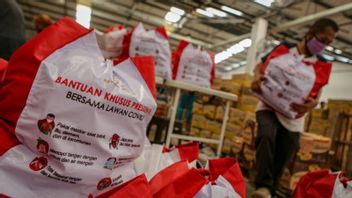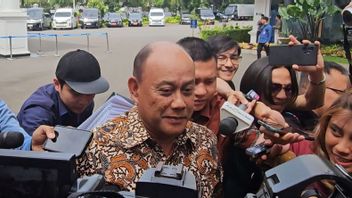
Minister of Finance Sri Mulyani Indrawati revealed that she received directions from President Prabowo Subianto to prioritize work programs and ministry/institutional budgets to support the implementation of Nutritional Lunch (MBG) which is important in building healthy and intelligent Indonesian children.
"The priority of attention to work programs and the KL budget to support the implementation of Nutrition Lunch is important to build healthy and intelligent Indonesian children," he said in a personal upload of the official Instagram account @smindrawati, Thursday, January 23.
Sri Mulyani explained that the directive was given during the Plenary Cabinet Session on January 22, 2025 regarding the evaluation of the performance of the three-month Red and White Cabinet. In his directive, the President emphasized the importance of maintaining cohesiveness and cooperation between members of the Red and White Cabinet.
"Presidential directive @prabowo regarding the evaluation of the performance of the 3 months of the Red and White Cabinet. The importance of maintaining cohesiveness and cooperation in the Red and White Cabinet," he said.
In addition to supporting the implementation of Nutritious Lunch, Sri Mulyani added other important aspects, namely food and energy security, as well as strong national defense development.
Sri Mulyani added the importance of spending efficiency and focusing on using the ministry/institutional and regional budgets to support national priorities.
In addition, Sri Mulyani added that support for downstream investment is also considered crucial to strengthen the economy and encourage economic growth through the State Revenue and Expenditure Budget (APBN) and State-Owned Enterprises (BUMN).
For information, President Prabowo Subianto issued regulations regarding the efficiency of the Expenditure Budget in the Implementation of the State Revenue and Expenditure Budget (APBN) and the Regional Revenue and Expenditure Budget (APBD) for the 2025 fiscal year amounting to IDR 306.69 trillion.
The policy is contained in the presidential instruction (Inpres) number 1 of 2025 concerning the Efficiency of Expenditures in the Implementation of the State Budget and Regional Budget for the 2025 fiscal year. The regulation immediately took effect when it was issued on January 22, 2025.
The rules are addressed to the Ministers of the Red and White Cabinet, the Commander of the Indonesian National Armed Forces, the Head of the Indonesian National Police, the Attorney General of the Republic of Indonesia, the Heads of Non-Ministerial Government Institutions, the Heads of the Secretariat of State Institutions, the Governors, and the Regents/Mayors.
In addition, in the directive, it is requested to carry out reviews according to their respective duties, functions, and authorities, in the context of efficiency in the budget, Ministries/Institutions (K/L), Regional Budgets and Transfers to Regions in the State Budget for Fiscal Year 2025, based on the provisions of the legislation.
The efficiency directive is contained in the second instruction point, namely efficiency in the state budget for the 2025 Fiscal Year of IDR 306.69 trillion.
"The efficiency in the state budget for the 2025 Fiscal Year is IDR 306,695,177,420,000," he wrote in President Prabowo's Instruction issued on January 22, 2025, quoted Wednesday, January 23.
The regulation explains the total details of the budget cut by IDR 306.69 trillion from the total 2025 state expenditure of IDR 3,621.3 trillion. The efficiency consists of a K/L expenditure budget of IDR 256.10 trillion, and a TKD of IDR 50.59 trillion.
Furthermore, in the third dictum, the Presidential Instruction instructs all Ministers/Leaders of Institutions to identify the Ministry/Institution's spending efficiency plan according to the amount set by the Minister of Finance.
Meanwhile, the identification of the efficiency plan includes operational and non-operative spending, consisting at least of office operational expenditures, maintenance spending, official travel, government assistance, infrastructure development, and procurement of equipment and machinery.
Then, the identification of the efficiency plan as referred to does not include the expenditure of employees and spending on social assistance.
Then, budget efficiency is prioritized for spending apart from the budget sourced from loans and grants and Rupiah Murni Assistance unless it cannot be implemented until the end of the 2025 Fiscal Year.
SEE ALSO:
Next, the budget sourced from Non-Tax State Revenue of Public Service Agency (PNBP-BLU) except for those deposited into the state treasury for Fiscal Year 2025.
Furthermore, the budget is sourced from State Sharia Securities (SBSN) and becomes an underlying asset in the context of issuing SBSN.
In addition, the dictum conveyed the results of the identification of the budget efficiency plan as referred to in number 1 to the partners of the House of Representatives Commission for approval.
Then, submit the proposed budget revision in the form of budget blocking according to the amount of budget efficiency of each Ministry/Institution that has received approval as referred to in number 5 to the Minister of Finance no later than February 14, 2025.
The English, Chinese, Japanese, Arabic, and French versions are automatically generated by the AI. So there may still be inaccuracies in translating, please always see Indonesian as our main language. (system supported by DigitalSiber.id)














